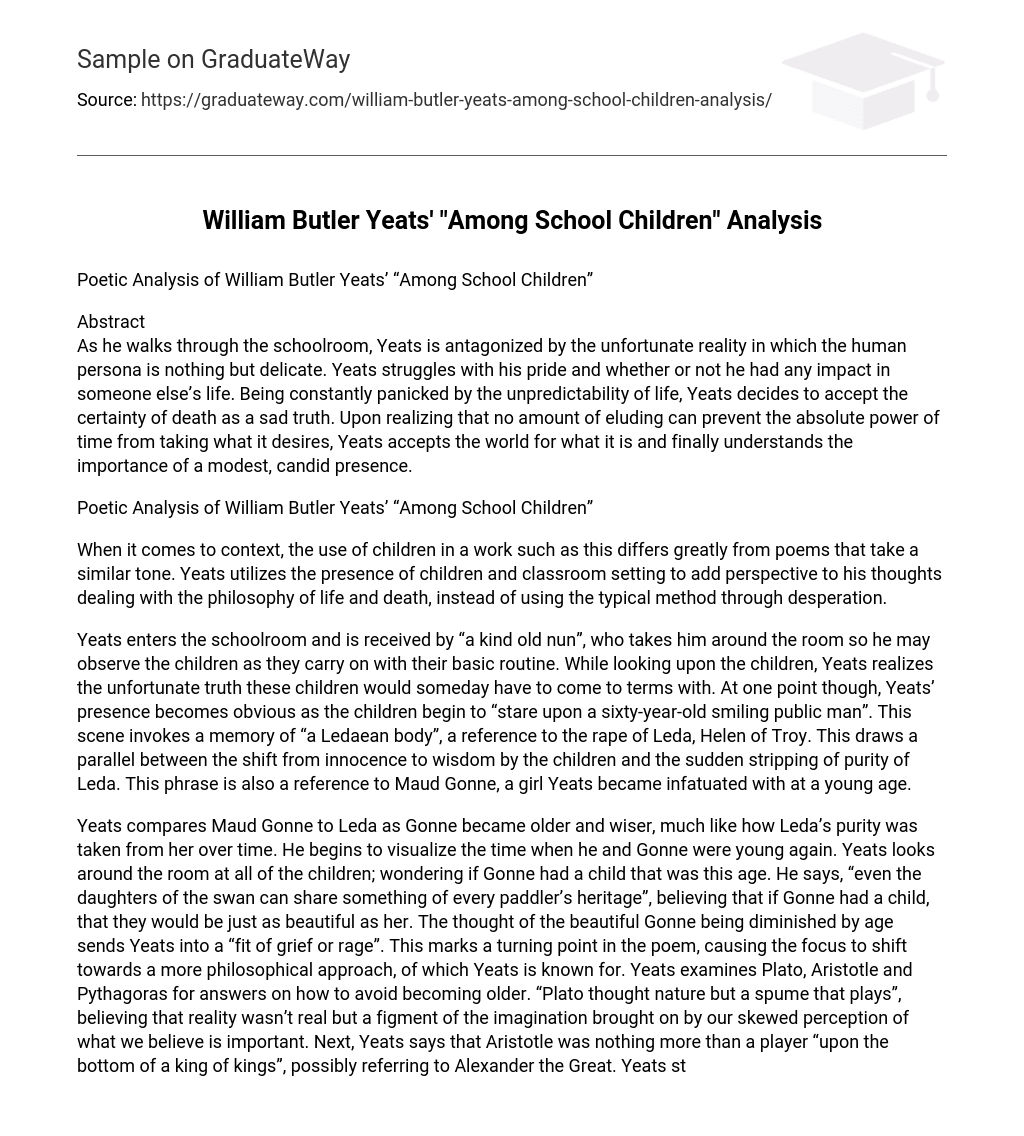Poetic Analysis of William Butler Yeats’ “Among School Children”
Abstract
As he walks through the schoolroom, Yeats is antagonized by the unfortunate reality in which the human persona is nothing but delicate. Yeats struggles with his pride and whether or not he had any impact in someone else’s life. Being constantly panicked by the unpredictability of life, Yeats decides to accept the certainty of death as a sad truth. Upon realizing that no amount of eluding can prevent the absolute power of time from taking what it desires, Yeats accepts the world for what it is and finally understands the importance of a modest, candid presence.
Poetic Analysis of William Butler Yeats’ “Among School Children”
When it comes to context, the use of children in a work such as this differs greatly from poems that take a similar tone. Yeats utilizes the presence of children and classroom setting to add perspective to his thoughts dealing with the philosophy of life and death, instead of using the typical method through desperation.
Yeats enters the schoolroom and is received by “a kind old nun”, who takes him around the room so he may observe the children as they carry on with their basic routine. While looking upon the children, Yeats realizes the unfortunate truth these children would someday have to come to terms with. At one point though, Yeats’ presence becomes obvious as the children begin to “stare upon a sixty-year-old smiling public man”. This scene invokes a memory of “a Ledaean body”, a reference to the rape of Leda, Helen of Troy. This draws a parallel between the shift from innocence to wisdom by the children and the sudden stripping of purity of Leda. This phrase is also a reference to Maud Gonne, a girl Yeats became infatuated with at a young age.
Yeats compares Maud Gonne to Leda as Gonne became older and wiser, much like how Leda’s purity was taken from her over time. He begins to visualize the time when he and Gonne were young again. Yeats looks around the room at all of the children; wondering if Gonne had a child that was this age. He says, “even the daughters of the swan can share something of every paddler’s heritage”, believing that if Gonne had a child, that they would be just as beautiful as her. The thought of the beautiful Gonne being diminished by age sends Yeats into a “fit of grief or rage”. This marks a turning point in the poem, causing the focus to shift towards a more philosophical approach, of which Yeats is known for. Yeats examines Plato, Aristotle and Pythagoras for answers on how to avoid becoming older. “Plato thought nature but a spume that plays”, believing that reality wasn’t real but a figment of the imagination brought on by our skewed perception of what we believe is important. Next, Yeats says that Aristotle was nothing more than a player “upon the bottom of a king of kings”, possibly referring to Alexander the Great. Yeats states, “what a star sand and careless Muses heard”, Explaining that the “Muses” of great men are all that remain and that men themselves cannot last forever.
In stanza 7, Yeats brings to light the difference between the worship, or love, of both mothers and nuns alike. Believing that a nun’s love for God and a mother’s love for her child will bring nothing but displeasure. Once again referring to Gonne and the frustration of her perfection being tainted, Yeats believes that anyone who glorifies any kind of perfection are “self-born mockers of man’s enterprise.” At the end of the poem, Yeats acknowledges that a person’s life and existence are only what they make of it. Only while in the company of youth, Yeats understands how brief life is, as well as accepts the inevitable truth that everyone grows old. Despite one’s accomplishments and endeavors, death is as crucial to the existence of life as anything else.





